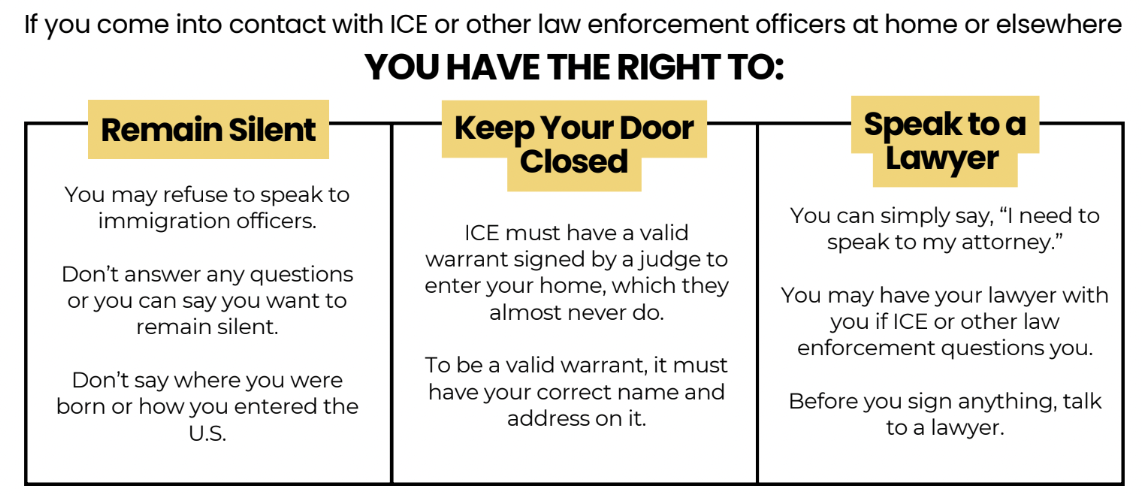Know your Rights: Immigration Information and Resources
Sus Derechos
Vocabulario Básico para Ejercer tus derechhos
- ANY law enforcement agent may try to ask you questions about your background, immigration status.
-‘Immigration’ usually refers to Immigration and Customs Enforcement (ICE) and Customs and Border Patrol (CBP). ICE and CBP are in charge of immigration enforcement within the United States and at the border, respectively. ICE agents often impersonate ‘police’ by wearing police badges, tactical gear, and other police indicia, and by announcing themselves as police. - You have the right to remain silent and not answer any question if an immigration agent attempts to talk to you.
- DO NOT let Immigration into your home and DO NOT step outside. Immigration must have a warrant signed by a judge or an occupant’s consent to enter your home. ICE will often trick you into giving consent by saying they are investigating a crime or need to “take a quick look around” or “come in to talk.” They might also show you a warrant that isn’t signed by a judge.
-DO NOT OPEN the door.
-ASK to see the judicial search or arrest warrant. They can slip it under the door or hold it up to a window. Do not step outside.
-CHECK if the warrant is signed by a judge, naming a person in your residence and/or areas to be searched at your address.
If they don’t produce a warrant, keep the door closed. State: “I do not consent to your entry.”
¿Qué pasa si me preguntan sobre mi estatus migratorio?
¿Qué debo hacer cuando Inmigración viene a mi puerta?
-Carry a know-your-rights card with you and show it if an immigration officer stops you.
Recomendaciones
Know your rights Download/ Descarge Conosca sus derechos (Eng/ Esp)
Red Card Download (Eng)
Descargar Targeta Roja
- If agents force their way in, don’t run, argue, resist, or obstruct the officer, even if you believe your rights are being violated.
-Keep your hands where police can see them.
-If you wish to exercise your rights, state: “I do not consent to your entry or to your search of these premises. I am exercising my right to remain silent. I wish to speak with a lawyer as soon as possible.” - Don’t lie about your status or provide false documents.
- Do not sign anything. You are not required to sign anything without consulting an attorney first.
- You are not required to show ID or immigration documents. If you have a valid green card or work permit, carry that with you, but tell the agent: “I wish to speak to an attorney.”
Reducir el Riesgo
Keep this in your car Download (Eng)
Descarga Guarda esta pagina en tu auto
Raid Hotline by CHIRLA
California Rapid Response Network Listing by CA Immigrant Policy Center
Know Your Rights: Immigrants' Rights by ACLU
Resources on subjects related to immigrant detention by California Collaborative for Immigrant Justice
Protest Pocket Guide by Democracy Security Project
Mental Health Resources for Undocumented People by Immigrants Rising
Mental Health Connector For Students in California by Immigrants Rising
Detained Immigrant Bond Fund by CLUE Justice, Los Angeles
Report Raids
What Community Can Do to Support:









